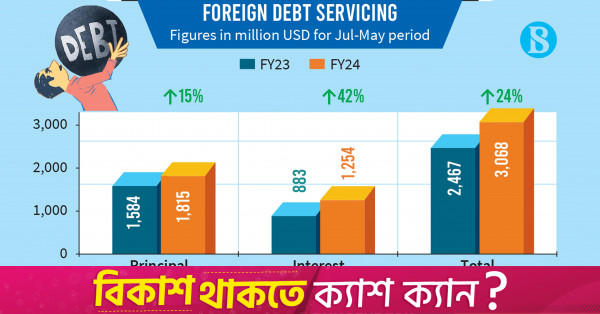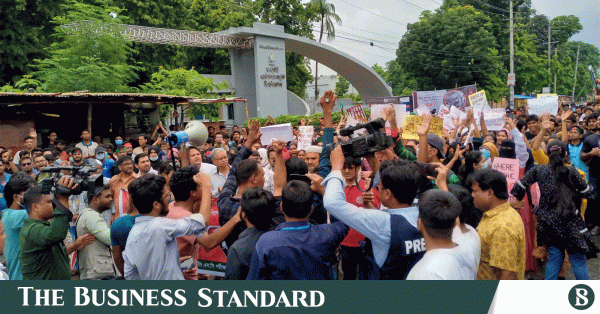Record $3b foreign debt repaid in 11 months


Economic Relations Department (ERD) data show that Bangladesh has repaid a total of $3.068 billion to its development partners during the first 11 months of the current fiscal year – the highest ever for the country, which is set to graduate from least developed country status in 2026.
Infographics: TBS
“>
Infographics: TBS
Bangladesh’s annual foreign debt servicing – both principal and interest – have exceeded $3 billion for the first time, driven by the initiation of principal repayments for several mega projects and the impact of high global interest rates.
Economic Relations Department (ERD) data show that Bangladesh has repaid a total of $3.068 billion to its development partners during the first 11 months of the current fiscal year – the highest ever for the country, which is set to graduate from least developed country status in 2026.
In the corresponding period of FY23, the repayment stood at $2.467 billion in interest and principal, which ultimately reached $2.67 billion by the end of the fiscal year.
At the end of the grace period, repayment of principal on loans for several mega projects, including the installation of Single Point Mooring with the Double Line and the Modernization of Telecommunication Network for Digital Connectivity projects, has commenced.
ERD officials said the principal repayment pressure of foreign loans has increased since the last financial year. The principal repayment amount will increase gradually in the current financial year and next financial year.
According to ERD data, the government has paid $1.8 billion in principal up to May of the current fiscal year, compared to $1.58 billion in the same period of the previous fiscal year.
On the other hand, Bangladesh faces high interest payments for market-based loans. The Secured Overnight Financing Rate (SOFR) has risen due to the Ukraine-Russia war.
The current SOFR rate is more than 5%, up from less than 1% before the conflict. Consequently, Bangladesh’s market-based loan costs are increasing gradually, resulting in higher interest payments.
Interest payments have grown by 42% in the 11 months to May of this fiscal year. The government has made interest payments of $1.25 billion in the current fiscal year, compared to $882.86 million in the equivalent period of the last fiscal year, according to ERD data.
Towfiqul Islam Khan, senior research fellow at the Centre for Policy Dialogue, said Bangladesh’s debt repayments are gradually increasing and are expected to continue rising. Debt repayments have increased by $500-600 million annually over the last three years.
“We are expected to pay back $3.2 billion in the next fiscal year. Currently, we have to repay debt by borrowing, which is not good for the economy,” he said, voicing his concern.
However, during the budget speech, the economist noted that the finance minister made a macroeconomic policy statement, citing ERD data, indicating that $2.7 billion would be required to repay debt in FY25. Khan pointed out that the initial estimate may not hold true by the end of the fiscal year.
He added that debt management is entering a critical juncture. In FY23, the government had to borrow Tk25,584 crore to repay the principal on foreign and external loans. In FY22, the government also borrowed Tk5,755 crore. This indicates that the government cannot cover the principal repayment of its external loans from revenue generation alone.
“Obviously,” he said, “the entire Annual Development Programme (ADP) is now dependent on loans, putting further pressure on the debt status.” The figures presented in the medium-term macroeconomic policy statement appear to have been underestimated.
“For example, the foreign debt principal repayment projection for FY25 is estimated to be $2.6 billion, according to the medium-term macroeconomic policy statement, while the budget allocation is programmed for $3.2 billion,” Khan added.
The economist emphasised that the government should establish an independent committee to assess the situation. He also suggested that relevant parliamentary committees initiate this process.
Meanwhile, during the July-May period of the current financial year, commitments by development partners increased by 33%.
According to ERD data, the government has received commitments of $7.92 billion in the current financial year up to May, compared to $5.974 billion in the same period a year ago.
Among the development partners, the Asian Development Bank (ADB) has pledged the most during the July-May period, with the government signing contracts worth $2.69 billion with this regional lender in 11 months.
Following this, the government received a pledge of $2.03 billion from Japan and $1.41 billion from the World Bank.
On the other hand, during the July-May period, development aid agencies released $7.02 billion, which was $6.98 billion in the equivalent period of the last fiscal year.
Japan has released the largest amount – $1.8 billion – in the last 11 months, followed by ADB at $1.59 billion and the World Bank at $1.4 billion.




